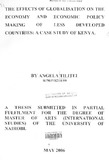| dc.description.abstract | This paper seeks to question some of the assumptions that are being made about the effects of globalisation on the economy and economic policy making in Less Developed Countries (LDC's) using Kenya as a case study. The research was analyzed within the context of international political economy and it builds a framework on the concepts of neo-liberalism.
Globalisation is a multi-dimensional process, which is transforming at a rapid rate and in a profound way all aspects of national and global activities and interactions. This study seeks to analyze the far-reaching implications of globalisation on LDC's with a focus on the economic environment and economic policymaking. It further explores the relationship between the state and globalisation. The study based on extensive research on Kenya, revealed that there are constraints and advantages of globalisation, in economic development and LDC's are not benefiting. The thesis has analysed the disparity and its results challenge the assumption that globalisation benefits all countries.
This study reveals that to benefit from globalisation certain mechanisms have to be in place such as good governance, democracy, economic reforms,
policy reforms, technical assistance and respect for an ever-expanding list of human rights
The research also shows that transfer of model economic policies that are recommended by World Bank (WB) and International Monetary Fund (IMF) are not wholly successful. Policies should be formulated to fit individual states, as the needs are different and various within each country.
Given the current trends in globalisation, it IS clear that less developed countries; need to immediately commence a process of strategic global repositioning. However, the internal changes required in these economies to adapt to this new environment must be complemented by action at the international level. The thesis concludes by indicating that, LDC's should not wait for action by the international community to begin their adjustment process. The extent to which these countries can take advantage of and capitalize on opportunities presented by the new global marketplace ultimately depends on proactive measures taken internally. Indeed, this paper realizes that the overall impact of globalisation can be positive or negative depending on the economic policies implemented by individual countries. | en |

